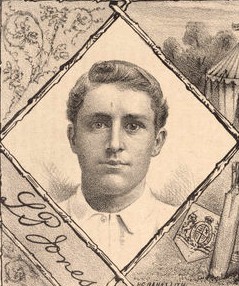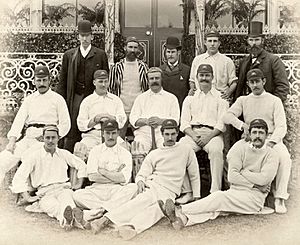Sammy Jones facts for kids
 |
||||||||||||||||||||||||||||||||||||||||
| Personal information | ||||||||||||||||||||||||||||||||||||||||
|---|---|---|---|---|---|---|---|---|---|---|---|---|---|---|---|---|---|---|---|---|---|---|---|---|---|---|---|---|---|---|---|---|---|---|---|---|---|---|---|---|
| Full name |
Samuel Percy Jones
|
|||||||||||||||||||||||||||||||||||||||
| Born | 1 August 1861 Sydney, Australia |
|||||||||||||||||||||||||||||||||||||||
| Died | 14 July 1951 (aged 89) Auckland, New Zealand |
|||||||||||||||||||||||||||||||||||||||
| Batting | Right-handed | |||||||||||||||||||||||||||||||||||||||
| Bowling | Right-arm fast-medium | |||||||||||||||||||||||||||||||||||||||
| Role | All-rounder | |||||||||||||||||||||||||||||||||||||||
| International information | ||||||||||||||||||||||||||||||||||||||||
| National side | ||||||||||||||||||||||||||||||||||||||||
| Test debut (cap 30) | 17 February 1882 v England | |||||||||||||||||||||||||||||||||||||||
| Last Test | 10 February 1888 v England | |||||||||||||||||||||||||||||||||||||||
| Career statistics | ||||||||||||||||||||||||||||||||||||||||
|
||||||||||||||||||||||||||||||||||||||||
|
Source: cricinfo, 27 March 2017
|
||||||||||||||||||||||||||||||||||||||||
Samuel Percy Jones (born August 1, 1861 – died July 14, 1951) was an Australian cricketer. He played in 12 Test matches for Australia between 1882 and 1888. A Test match is the longest form of cricket, played over several days.
Sammy Jones was a strong right-handed batsman. He was also a useful medium-pace bowler. A bowler tries to get the batsman out. He played very well for the New South Wales team. Later, he played for Queensland and Auckland.
Contents
Sammy Jones's Cricket Journey
Sammy Jones traveled a lot for cricket. He toured England with the Australian team in 1882, 1886, 1888, and 1890. He also visited New Zealand with the Australian team in 1886–87. Later, he toured New Zealand again with the Queensland team in 1896–97.
Batting Success on Tour
During the 1886 tour of England, Sammy Jones scored many runs. He made 1497 first-class runs. First-class cricket is a high level of the sport, just below Test matches. He scored two centuries (100 runs or more in one innings). His best score was 151 runs against a team called the Gentlemen at The Oval. This showed how good he was at batting. His career in first-class cricket lasted for over 30 years!
Famous Cricket Moments
Even though Sammy Jones had some good scores in Test matches, people often remember him for two famous stories. These stories come from the early days of Test cricket.
The W. G. Grace Incident
One famous event happened in a Test match in 1882. Sammy Jones was batting and thought the ball was "dead." This means the play was over. He left his batting area to flatten the pitch with his bat. But the famous English cricketer W. G. Grace quickly threw the ball at the wickets. Sammy Jones was "run-out." Being run-out means a player is out if they are not in their safe area when the ball hits the wickets. This caused a big stir because players usually don't get out this way.
The "Unlucky" Score
Sammy Jones's highest score in a Test match was 87 runs. This score became part of an Australian cricket superstition. Some people believed that 87 was an unlucky score. This was because it was 13 runs short of a century (100 runs).
Life After Playing Cricket
Sammy Jones moved to New Zealand in 1904. There, he continued to be involved in cricket.
Coaching and Retirement
First, he coached the Grafton District Cricket Club. After that, he worked for the Auckland Cricket Association. He played his very last first-class match for Auckland in December 1908. He was 47 years old then. From 1904 until he retired in 1935, Jones worked as a clerk and cricket coach at Auckland Grammar School.


